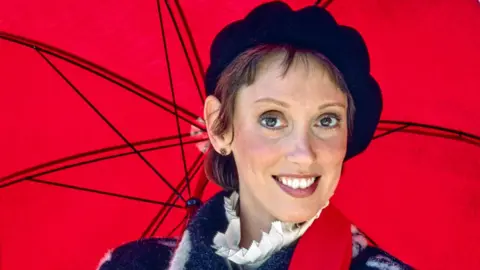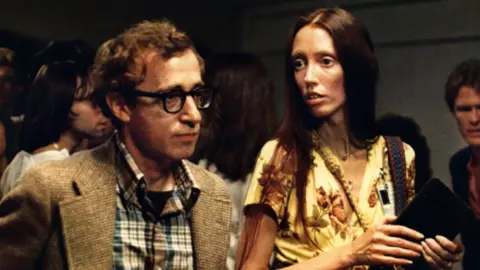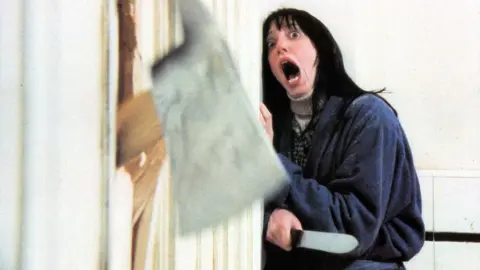By Ian Youngs, Culture reporter
 Getty Images
Getty ImagesUS actress Shelley Duvall, known for films like The Shining, Annie Hall and Nashville, has died at the age of 75.
Her partner Dan Gilroy confirmed the news to The Hollywood Reporter.
“My dear, sweet, wonderful life partner and friend left us. Too much suffering lately, now she’s free. Fly away, beautiful Shelley,” he said, according to the outlet.
She died in her sleep of complications from diabetes at her home in Texas, Gilroy said.
Duvall’s other credits included 1977 drama 3 Women, directed by Robert Altman, for which she won the Cannes Film Festival’s best actress award and was nominated for a Bafta.
Three years later, she starred as Olive Oyl opposite Robin Williams in Altman’s musical version of Popeye.
But Duvall fell out of favour in Hollywood and was off screens for two decades, before making her comeback in 2023’s The Forest Hills.
 Getty Images
Getty ImagesWith her large brown eyes and offbeat charisma, Duvall was a distinctive and compelling presence.
She began her career, and her association with Altman, in 1970 dark comedy Brewster McCloud, and the pair reunited for McCabe and Mrs Miller in 1971.
After filming her performance as a woman who falls for a 1930s bank robber in their next movie, Thieves Like Us, Altman told her: “I knew you were good, but I didn’t know you were great.”
She said that remark was “the reason I stuck with it and became an actress”.
The director stuck with her, once saying she “was able to swing all sides of the pendulum: charming, silly, sophisticated, pathetic, even beautiful”.
Altman cast her again in 1975’s Nashville, his satire of US society, politics and country music.
Their next collaboration, 3 Women, saw Duvall play a talkative, trend-following health spa attendant. The Guardian’s Anne Billson ranked it as her best role, and “quite simply one of the greatest performances of the 1970s”.
Meanwhile, also in 1977, Duvall memorably played Pam, a Rolling Stone reporter who went on a date with Woody Allen’s Alvy in Annie Hall.
 Getty Images
Getty ImagesHer best-known role was perhaps Wendy, the wife of Jack Nicholson’s terrifying hotel caretaker in Stanley Kubrick’s 1980 horror classic The Shining.
Filming was an ordeal. “I had to cry 12 hours a day, all day long, the last nine months straight, five or six days a week,” she once recalled.
After that, Duvall’s film roles included Terry Gilliam’s Time Bandits and Roxanne with Steve Martin.
She also set up her own production companies, and made and hosted beloved 1980s children’s TV show Faerie Tale Theatre.
Her acting roles diminished in the 1990s, with Jane Campion’s The Portrait of a Lady the pick of the crop, and she dropped off the radar in 2002.
The New York Times attributed her apparent disappearance to the impact of a 1994 earthquake that damaged her Los Angeles home, and the stress of her brother having cancer.
Discussing her prolonged absence from the screen, she told the paper in May she had been the victim of a fickle film industry. “I was a star. I had leading roles. People think it’s just ageing, but it’s not. It’s violence,” she said.
Asked to explain, she said: “How would you feel if people were really nice, and then, suddenly, on a dime they turn on you?
“You would never believe it unless it happens to you. That’s why you get hurt, because you can’t really believe it’s true.”
‘Ultimate film star’
Concerns about her health were raised when she appeared on the TV talk show Dr Phil in 2016 and told him: “I’m very sick. I need help.”
She also talked about receiving messages from a “shapeshifting” Robin Williams following his death, and talked about malevolent forces who were out to do her harm, the paper said.
Speaking about that period, Gilroy told the New York Times she had become “paranoid and just kind of delusional”.
Asked by the paper why she had agreed to return to the screen in The Forest Hills, she replied: “I wanted to act again. And then this guy kept calling, and so I wound up doing it.”
Novelist Nicole Flattery wrote in the Financial Times in 2023 that her return showed her magic had remained intact.
In an article dubbing her the “ultimate film star”, Flattery summed up her talent, writing: “She’s a master at playing characters who act happy when they’re sad, their daffiness masking depth.”


